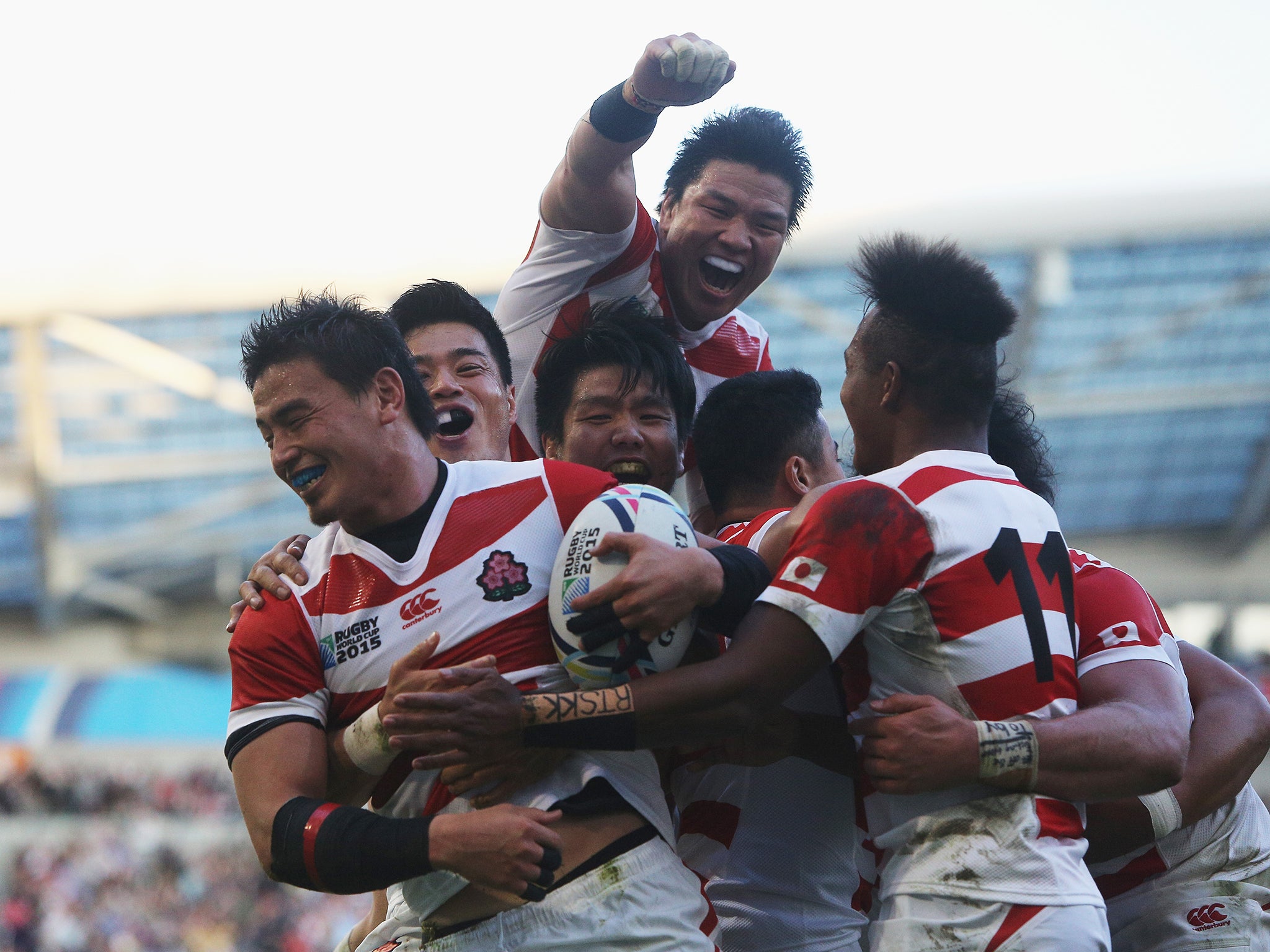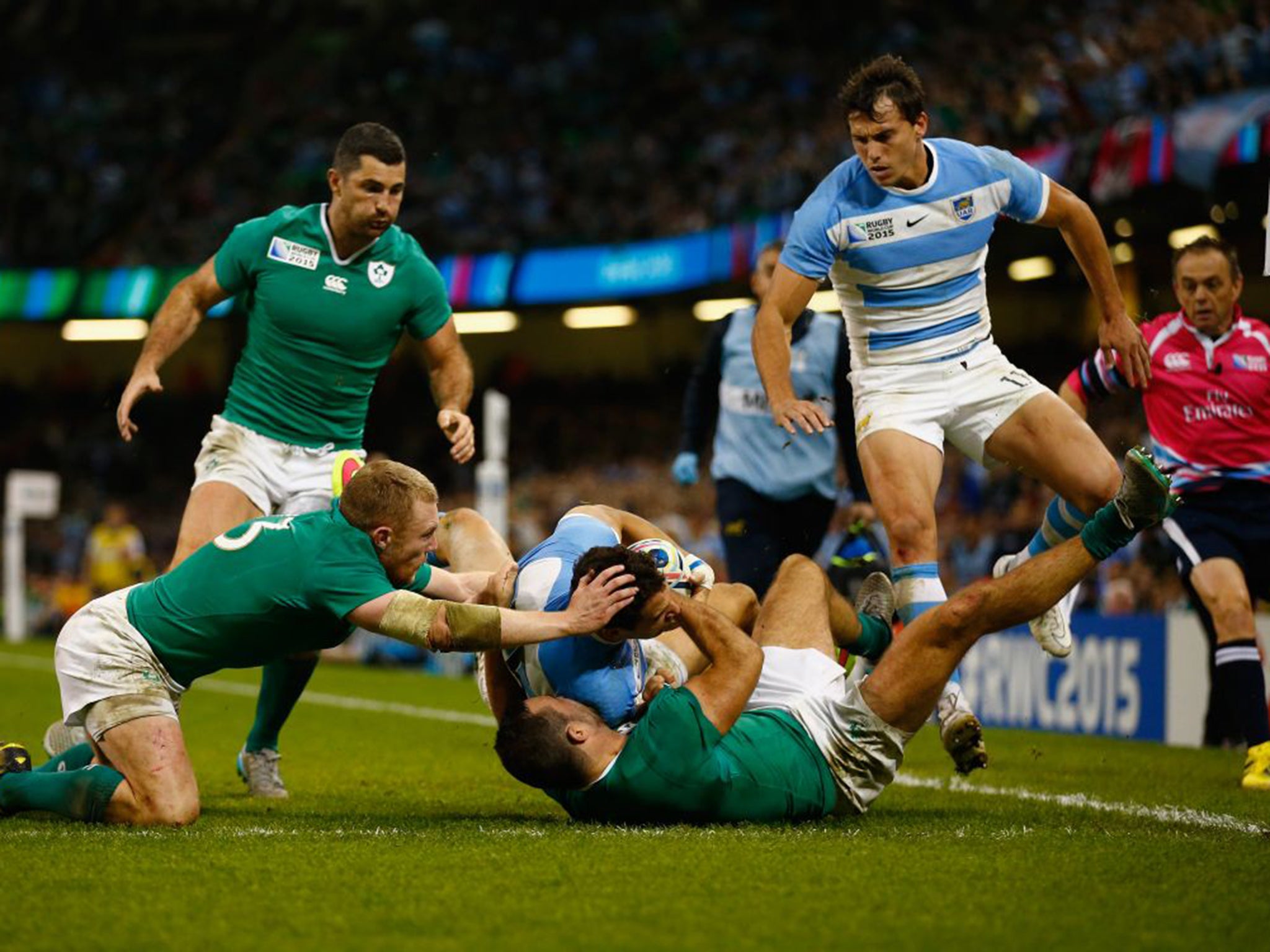RWC 2015 reflections: Japan’s rising sun puts glow on a tournament to cherish
The next World Cup hosts provided the best story here – but young England players could be worn out by then

It was the best of World Cups, and the worst of World Cups. The hosts England were knocked out too early, down and out in London and Manchester, and plunged into painful navel-gazing. All around them, packed-out crowds roared their approval of mostly positive rugby, Japan were garlanded with thanks for the stunningly unexpected kick-start of an opening-weekend win over South Africa, and if teams from south of the equator eventually filled all four semi-final places, it was hardly a gigantic surprise. From a parochial point of view, this was the tournament that kept on giving, even if the wrong teams kept on winning.
Jonny Wilkinson, whose presence alongside Sir Clive Woodward in the TV punditry studio was a constant reminder of 2003 and all that, called England’s pool-stage elimination “an emptiness, a dream gone begging. These chances don’t come round often”. Too right, Jonny. It may be 2027 at the earliest before we see a home World Cup like this again.
Wales, Scotland and Ireland, in differing ways, were paid-up members of the missed opportunity club: Wales’s barely believable injury toll in the backs segued with an inability to put a try past 13 Australians; a similar run of injuries plus a rush of blood to Sean O’Brien’s head left Ireland short of five first-choice players for the quarter-final loss to Argentina; and Scotland were the epitome of “so near and yet so far”, one bungled line-out and a controversial refereeing decision away from knocking out Australia.
The straw clutched at by Wilkinson – in common with Rob Andrew of the RFU, pre-tournament, and Stuart Lancaster, the head coach – was that England’s best players were of an age that made them more likely to succeed at the next World Cup in Japan in 2019. “You can’t cheat time,” Wilkinson said. “They need to stay together.” Ah, but will they? Or will a relentless schedule break the brighter sparks of 2015: Anthony Watson, Joe Launchbury, George Ford and Henry Slade among them.

Bath owner Bruce Craig is desperate to win the Premiership title in this, his club’s 150th anniversary season, and the European Cup is a valued prize, too. Lots of big matches to come there, all topped off by England’s three-Test tour to Australia next June. The Lions go to New Zealand the following summer. So the opportunities to rest are scarce, and as for time to take a fresh look at what the national team might need, that comes down to a fortnight before the Six Nations, when there may be a new coaching team and captain.
The call by the incumbent skipper Chris Robshaw to ignore a shot at the posts in the pivotal pool match against Wales, when a draw would have been a good result, was a major error but you could say the heart dropped out of England’s bid with the tear of a muscle in Jonathan Joseph’s chest. Certainly the fate of the Bath centre and the domino effect his pectoral injury induced was achingly emblematic of English rugby’s present woes.
Joseph was the nation’s brightest star from last spring’s Six Nations. He hurt himself during the Fiji pool match, was replaced by Sam Burgess (not by the more obvious like-for-like choice, Slade) for the loss to Wales, and returned against Australia only to blow a six-on-two overlap in the second half. Now Joseph is out for three months after surgery, and he might miss the start of the Six Nations in January, which in turn will mean yet another rethink in the England midfield.
Sir Graham Henry, the winning head coach in 2011, hinted that England would be better not reinventing the wheel. “Not very long ago, they would dominate physically, and field position and points would mount,” Henry pointed out. “There was an intelligent navigator behind, keeping England down the right end of the field or probing with contestable, perhaps try-scoring, kicks and the odd field goal; the backs would complement the platform by providing the finish. Is that not how kids in England have grown up learning the game?” The RFU have begun to reduce contact in youngsters’ early years, emphasising thinking and strategy instead.
Maybe England got unlucky with the pool of death, but the right attitude, as expressed by Australia’s head coach Michael Cheika, was “win every game and you go through”. Cheika also spoke of his squad’s “jokers, lovers and fighters” and engagingly embodied all three.
Fiji, Argentina, Georgia , Romania and Namibia all gave us memorable moments but the standout story arrived early. We reporters had been required to nominate our pool-stage matches to go to six months in advance; Japan v South Africa in Brighton was my pick of what seemed to be a middling lot on the first Saturday.
There had been reports of Japan building nicely, but no one expected their 34-32 win, or the manner of it, with Japan forwards driving the two-time champion Springboks over their own line.
Set-piece coach Steve Borthwick’s work with Japan – the first team to win three matches without making the quarter-finals, which was incredibly timely for the 2019 hosts – marked him out as an England assistant coach sooner rather than later.
If one secondary school in north London was anything to go by, the World Cup produced an instant rush, with double the normal numbers turning up for first XV training. Sadly we will never know what boost a winning home nation might have given. Instead the spectators, broadcasters and sponsors ticked over a record £160m profit for World Rugby; the September and October sun mostly shone, and there was some kind of communal belief in Paloma Faith’s TV theme, “World in Union”. Or as the irrepressible Japan coach Eddie Jones put it: “Sometimes the game smiles on you, mate.”
Join our commenting forum
Join thought-provoking conversations, follow other Independent readers and see their replies
Comments
Bookmark popover
Removed from bookmarks